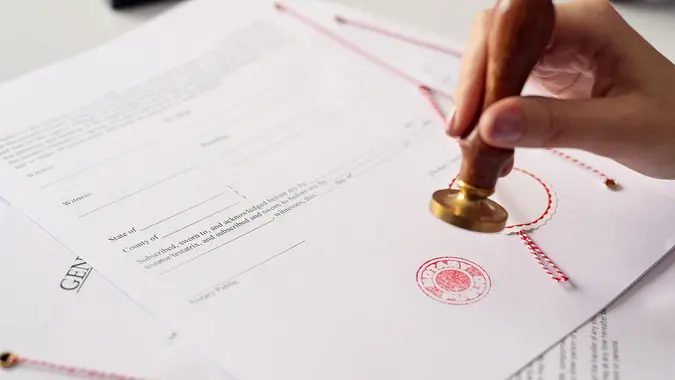Here’s How Another Trump Presidency Could Affect Your Side Gig

Commitment to Our Readers
GOBankingRates' editorial team is committed to bringing you unbiased reviews and information. We use data-driven methodologies to evaluate financial products and services - our reviews and ratings are not influenced by advertisers. You can read more about our editorial guidelines and our products and services review methodology.

20 Years
Helping You Live Richer

Reviewed
by Experts

Trusted by
Millions of Readers
Republican nominee Donald Trump’s economic agenda is much different than his opponent’s, and his reelection could have wide-ranging implications on several issues. One of them is the potential impact on gig workers, who make up a large — and growing larger — chunk of the American worker population.
The numbers speak for themselves: This year, the number of gig workers in the country is expected to reach a startling 76.4 million, according to DoorDash, and independent workers represent 45% of the U.S. workforce, according to an MBO Partners report. Meanwhile, Statista reported that 86.5 million people will be freelancing in 2027, representing exactly half of the U.S. workforce.
Here is how another Trump presidency could affect your side gig, according to experts. And here is an economist’s prediction for the overall job market if Trump were to be elected.
More Money in Their Pockets
Trump enacted the Trump Tax Cuts and Job Acts (TCJA) in 2017, which is set to expire in 2025. As part of his campaign promises, Trump has said he would make the provisions permanent, which include increasing the standard deduction, lowering corporate and estate tax rates and increasing the child tax credit.
Thomas Savidge an economist at the American Institute for Economic Research, argued that if Trump wins the election and the law is made permanent, Americans working side gigs could be able to keep more of what they earn as well as see lower tax compliance costs.
“If the TCJA is allowed to expire,” Savidge said, “Americans will face higher tax rates and a more complicated tax filing process.”
It Would Depend on the Nature of the Side Gig
Some experts argue that a key factor in a second Trump Administration would be the nature of a side gig.
For instance, if the side gig is more traditional in nature and the individual receives a W-2, the worker might benefit from an income tax reduction similar to Trump’s budget in his first term, said Dr. Jim Ronan, adjunct professor of political science at Villanova University.
“However, if the side gig is more cash based, a reduction in tax rates would not be impactful,” Ronan added.
He said the same would apply to Trump’s plan to replace income taxes with higher tariffs, since in that case, cash-based side gigs certainly would feel the impact of increases in overall costs, but not the benefits of eliminating income taxes.
Proposal To Eliminate Federal Taxes on Tips
As Ronan also noted, Trump’s proposal to eliminate federal taxes on tips, which he mentioned in his Republican National Convention speech, also could impact gig workers.
“For those hotel workers and people that get tips, you’re going to be very happy. Because when I get to office, we are going to not charge taxes on tips,” Trump said at a July rally in Las Vegas.
However, as Ronan noted, such a plan remains very abstract.
Reversal of Biden’s Independent Workers Rule
In March, a new Department of Labor (DOL) rule took effect, which reclassified some independent contractors as employees based on several criteria. One of them entails the extent to which the work performed is an integral part of the employer’s business.
Several Republicans quickly voiced their opinions on the rule, arguing that it would hurt gig workers and that a Trump presidency could potentially reverse the rule.
For instance, Sen. Bill Cassidy (R-La.) introduced a resolution to repeal the rule that he said “dismantles the gig economy.”
“Independent contractors, or freelancers, are shielded from forced or coerced unionization that would strip their flexibility away,” he said. “This has made eliminating freelancing a top priority for large labor unions who want more workers paying forced union dues.”
Mixed Effects
According to other experts, Trump’s policies could have mixed effects on the gig economy.
While tax cuts, deregulation and support for innovation could provide financial benefits and foster growth in side gig opportunities, challenges such as reduced worker protections, healthcare access and economic volatility due to trade policies could pose significant risks to gig workers, said Karla Dennis, founder and CEO of Karla Dennis & Associates.
“The overall impact would depend on the balance between these positive and negative factors,” she added.
Rene Lacad, an entrepreneur and content creator, echoed the sentiment, noting that a shift toward deregulation might alleviate some business challenges, offering workers more flexibility with fewer constraints.
“However, this could also lead to reduced protections and benefits as the government might be inclined to categorize workers as contractors rather than employees,” Lacad said.
While this strategy could cut down on operating expenses for companies, it also could restrict workers’ access to benefits such as healthcare and unemployment insurance, impacting their well-being and stability, he added.
Editor’s note on election coverage: GOBankingRates is nonpartisan and strives to cover all aspects of the economy objectively and present balanced reports on politically focused finance stories. For more coverage on this topic, please check out Here’s How a Harris Presidency Could Affect Your Side Gig.
 Written by
Written by  Edited by
Edited by 

























